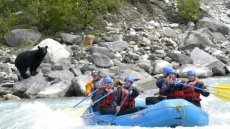EDMONTON — A report into the death of a Canadian Forces member who was buried under metres of snow during an exercise is recommending more avalanche training for search-and-rescue technicians.
Sgt. Mark Salesse, 44, was swept off a narrow mountain ledge by an avalanche on Feb. 5, 2015, in Banff National Park.
The military board of inquiry report also recommends that troops use proper rescue and communications equipment when taking part in ice climbing and backcountry skiing training in terrain with an avalanche hazard.
Salesse wasn't wearing an avalanche transceiver, a device that allows rescuers to hone in on a signal to locate buried victims.
Liz Quinn, Salesse's mother, released the recommendations Tuesday after receiving the report from the military.
"I'm very pleased about the report and I am very pleased about the recommendations," Quinn said from her home in Moncton, N.B. "It is important to know that the military is taking this seriously."
The report also recommends that search-and-rescue technicians, known as SAR Techs, update their mountain rescue training skills every year.
Quinn said the military has indicated that all of the recommendations have been approved.
Canadian Forces officials were not immediately available for comment.
Salesse was a member of the Royal Canadian Air Force and served with 435 Transport and Rescue Squadron based at 17 Wing Winnipeg.
He was last seen alive by three other SAR Techs just before the avalanche swept him away.
The sergeant's body was found a week later under more than two metres of snow at Polar Circus, a popular ice-climbing area in the national park.
The military says becoming a SAR Tech is highly competitive and only about 16 candidates are chosen from dozens of applicants to attend an 11-month training course.
A military website says Salesse was a military supervisor with experience in mountaineering, ice and rock climbing, scuba diving and parachuting. He was also a primary care paramedic.
Quinn said she attended the board of inquiry into his death last May.
She hopes the recommendations will help other SAR Techs.
"There were no surprises," she said. "They addressed everything they promised last spring."



